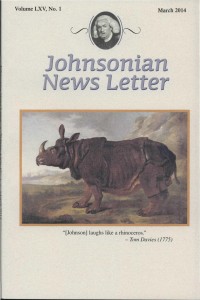Wednesday, June 25th, 2014...3:47 pm
March 2014 Issue

From the Editor
Recently, in the mail—the actual, material, non-electronic post—I received two books about Johnson in languages I do not understand. Fortunately, both contain enough material in English for me to make out their subjects. The first is a work in Chinese by an occasional contributor to the JNL, Tian Ming Cai. An appended table of contents in English, and a note from John Byrne (who acted as intermediary in sending the book), shows that the work includes translations of the Life of Savage and the Life of Cowley with some appendices: “A General View of Johnson Study Abroad” and “My Trip to Johnson’s Hometown: Lichfield.” Readers of the JNL may have seen previews of these works in recent issues (LXIV, 2 [September 2013] and LXI, 1 [March 2010]). Of course, being incapable of reading this book, I have little to say, but I note the somewhat surprising choice of “Cowley” to accompany “Savage.” I applaud the choice because the Life of Cowley is one of my favorites, and Johnson evidently thought it the best of his Lives because of the essay on the metaphysical poets (Boswell’s Life, IV.38). Perhaps “Cowley” and “Savage” are the best of the Lives and that’s the plain and simple answer to the question of why they were chosen. The book was published in 2013 in Beijing by the International Culture Publishing Company.
The other book I received is in Japanese. This work is by Isamu Hayakawa and its title, in the translation provided, is Dr. Johnson’s Dictionary in the Context of the Eighteenth-Century Enlightenment in England. It was published in Yokahoma by Shunpu-sha Publishing also in 2013. There is a brief English introduction, and many (perhaps all) of the quotations of the Dictionary, and English commentary on the Dictionary, are in their original language. The English introduction includes brief summaries of the eleven chapters and the appendix. This list shows that the book includes Japanese translations of the Plan and Preface; separate chapters on the history of British lexicography before Johnson, “A view of academies for establishing an elegant ‘national language,’ and the history of lexicography between Johnson and the OED. Several chapters treat Johnson’s lexicographical principles and his practice, and one is devoted to “Quotations from Johnson’s Dictionary as an illustration of accumulated British wisdom and knowledge.” The appendix is a list of works quoted in Johnson’s Dictionary with a count of the number of times each is referenced in the first and fourth editions combined. This list, like the very good bibliography, is useful even for those who read English but not Japanese. The list clearly makes use of the Cambridge University Press CD-ROM of the Dictionary, edited by Anne MacDermott, and probably uses studies of the quotations, such as Lewis Freed’s 1939 Cornell University dissertation, which is cited in the bibliography. Looking it over myself, I find that the list is not absolutely complete, but it seems very good nevertheless. Overall, this is a vast, handsome book (566 pp.) and, as far as I can tell, a good candidate for the shortlist of important books about Johnson’s Dictionary.”
Given China’s skyrocketing economy and our nation’s, as well as the world’s, “pivot to the Pacific,” it is hard not to reflect that these books are further evidence of the growing importance of eastern Asia in all aspects of human life. The cornerstone of the western literary tradition, Virgil’s Aeneid, concerns a translatio imperii, a translation of empire westward from Troy, in Asia, to the shores of Italy. Later writers tracked the course of empire as it went further west to England and then to America. In the wake of empire—or at its side—went the muses. (Adam Potkay writes very engagingly about this westward movement in the forthcoming Blackwell Companion to British Literature, volume 3). Americans are used to a further westering that locates the cutting edge of our culture on the shores of the Pacific, somewhere between Haight-Ashbury and Hollywood. Now it would appear that empire and the muses have gone so far west that they are again in the east. Having visited China last summer, I can report that the cities of Beijing and Shanghai are bigger, newer, more populous, and more frenetic than London, New York, or Los Angeles. Our hero once remarked that “the full tide of human life is at Charing Cross.” In later times Americans may justly have located that tide in Times Square, but now we have to confess that the full tide of human life is on the Bund in Shanghai. Looking across the Huang-po River to the impossible verticalities of Pudang, one can at least be happy that Johnson has a foothold there—a good old-fashioned, paper-and-ink foothold.
Comments are closed.